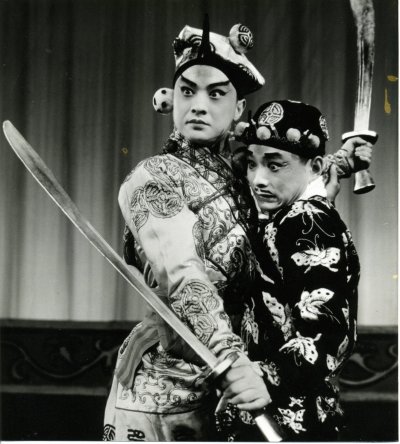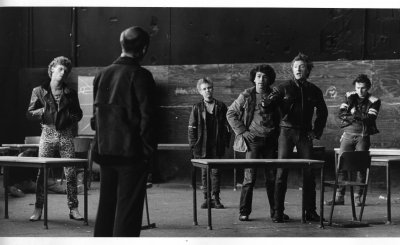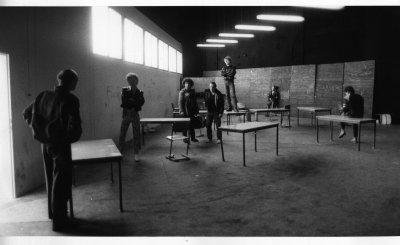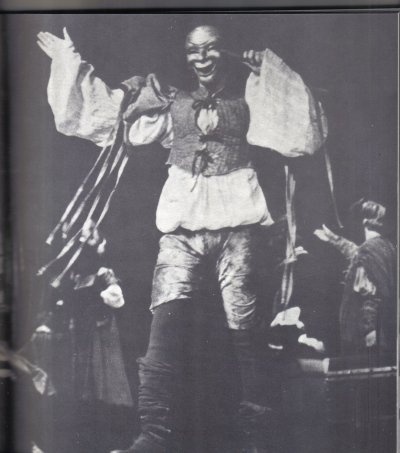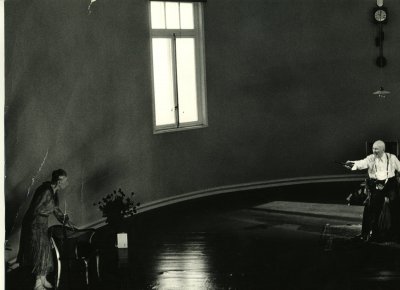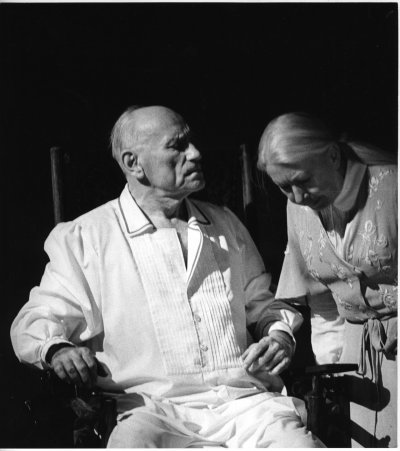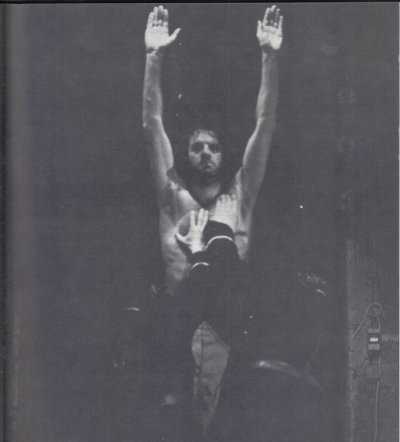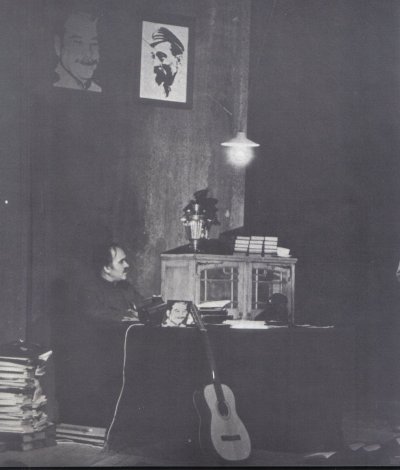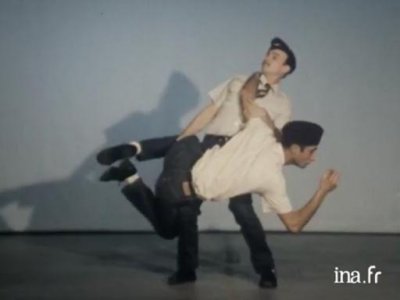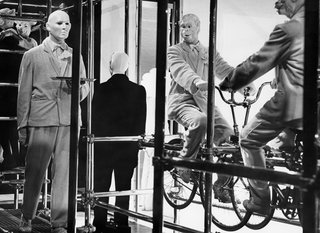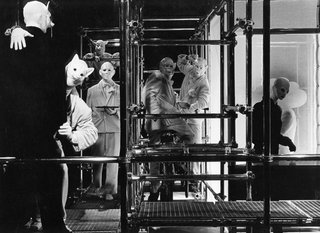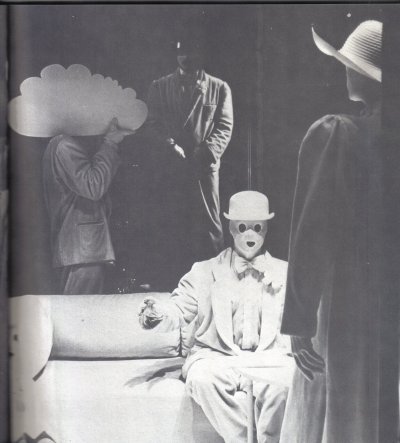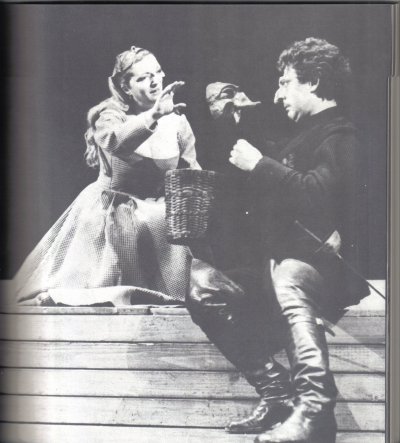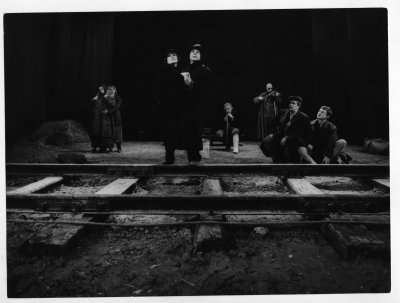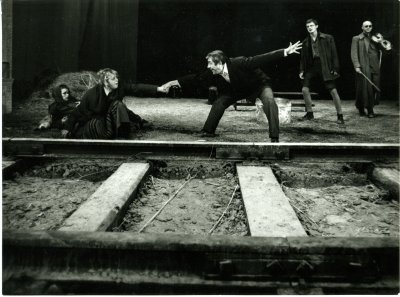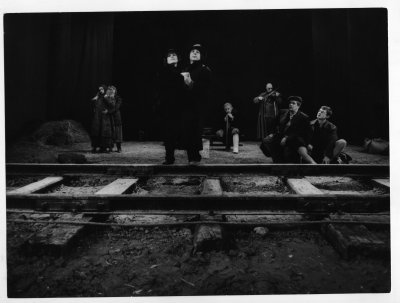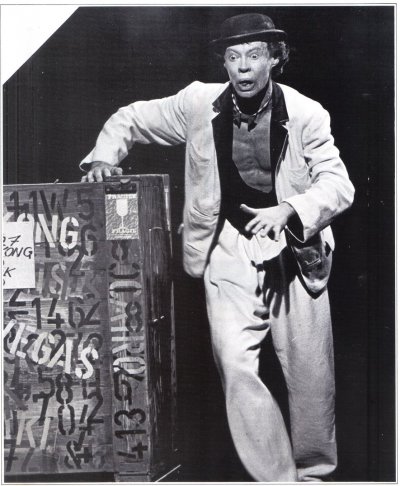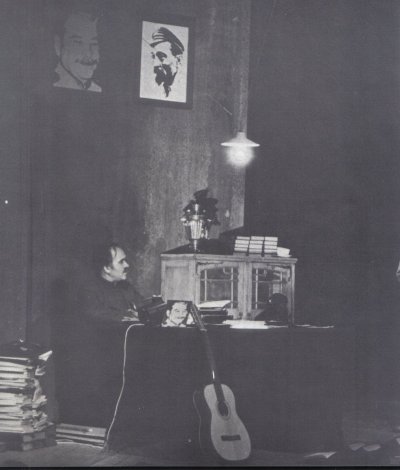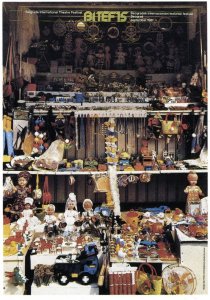
Dizajn / Design: Saveta Mašić / Slobodan Mašić (1939-2016)
PETNAEST GODINA TRAGANJA
U istoriji svetske civilizacije petnaest godina je kratak period, ali za svetsko pozorište dvadesetog veka vreme od 1967, kada je BITEF osnovan, do 1981, kada se održava 15. BITEF, jedno je od najplodnijih i najdramatičnijih perioda modernog pozorišta.
To je vreme neslućeno novih formi, doba izlaska iz baroknih i klasicističkih dvorana na ulice, trgove, u garaže, barutane, potkrovlja i podžemlja, dani kada je pozorište ponovo pripalo mladima i njihovom protestu, možda u naivnoj veri da je pozorištem mogućno menjati svet, najzad doba kada se pozorište ponovo vratilo u dvorane, ali preobraženo, podmlađeno i spremno da ponovo misli.
Setimo se samo pozorišnih pokreta koji su za ovih petnaest godina nicali – „totalno pozorište“, „pozorište surovosti“, „pozorište prizora“, „teatar gerile“, pozorište „novog teatralizma“ ili „nadrealističke obnove“, „pozorište kraja drugog milenija“. . .
Svemu tome BITEF je ne samo svedočio, nego u tome učestvovao. Na mapi pozorišnih zbivanja sedamdesetih godina BITEF je svetla tačka, na kojoj su mnoge danas istorijske predstave doživele svoje prvo međunarodno krštenje – Ronconijevi ,,Orlando Furioso“ i ,,Orestija“, ,,Sluškinje“ Victora Garcie i Nurie Espert, ,,Dionis 69″ Richarda Schechnera, ,,Hamlet“ Teatra na Taganke Jurija Ljubimova i ,,Don Žuan“ Teatra na Maloj Bronoj Anatolija Efrosa, ,,Troil i Kresida“ Davida Esriga iz Bukurešta i mnoge zapadnonemačke predstave danas slavnih reditelja kao što su Lietzau, Stein, Zadek, Peymann, Ciulli, Niels-Peter Rudolf. BITEF je i danas mesto na kom pozorišta stiču međunarodnu reputaciju.
Bez razumevanja i ambicije celog Beograda da postane i opstane centar jedne takve uznemiravajuće umetnosti kakvo je pozorište poslednje podrug decenije, ne bi bilo mogućno ostvariti takav koncept Beogradskog Internacionalnog Teatarskog Festivala.
Trebalo je katkada imati mnogo strpljenja i razumevanja, tolerancije i širine duha pa prihvatiti sve manifestacije ovog uznemiravajućeg pozorišta oko 1968. godine, to provokativno pozorište, golo telom i razgolićeno namerama, agresivno, a katkada i egzibicionističko u svojoj zahuktalosti.
Ne bi bilo BITEFA ni bez zamašnih sredstava koja su uložena za progres svetskog pozorišta preko BITEFA. Svetsko pozorište je to uzvratilo na svoj način – Beograd je bez svake sumnje najobavešteniji grad o teatru našeg vremena. Nijedno ime modernog teatra nije nepoznato Beogradaninu koji je iole pratio BITEF. Pored svih mogućnih i izgleda nužnih promašaja, nijedna zaista značajna predstava nije izostala sa BITEFA, makar i na filmskoj traci.
Tragali smo za novim tendencijama koliko smo mogli, znali i umeli. Katkada sami, odskora u grupi selektora. Uvek sa manje sredstava nego što su nam bile ambicije ili što je svet obilno nudio, ali takođe uz više razumevanja nego što bi se moglo očekivati prema okolnostima i turobnoj istoriji kulture na ovim prostorima. Još je rano za zaključke. Najmanje smo mi pozvani da ih činimo, kao aktivni učesnici, ponekad borci, a ponekad krivci na talasu novog pozorišta. Šta li će se roditi novo iz onog što je danas novo ili što je juče bilo novo? da li ćemo to novo svi zajedno prepoznati i u budućnosti?
Mira Trailović, Jovan Ćirilov
FIFTEEN YEARS OF SEARCHING
In the history of world civilization, fifteen years is a short period of time, but for the world theatre of the twentieth century, the period from 1967, when BITEF was established, to 1981, when the 15th BITEF is being held, is one of the most fruitful and the most dramatic periods of the modern theatre.
This is a period of new forms, undreamt of hitherto, a period of the emergence from baroque halls into the streets, squares, garages, powder magazines, attics and basements; days when the theatre once again belongs to the young and their protest, maybe in the naive belief that it is possible to change the world through the theatre; finally it is a period when the theatre once again returns into the hails, but returns transformed, rejuvenated and prepared to think again.
Think only of the theatre movements that cropped up in the course of these fifteen years the total theatre, the theatre of cruelty, the theatre of images, the theatre of guerilla, the theatre of surrealistic revival, the theatre de la fin du deuxième millénaire…
BITEF did not merely stand witness to all this, but took part in it too. on the chart of theatrical phenomenon of the seventies, BITEF is a bright spot at which many performances today thought of as historical, had their international baptismal ronconi’s „orlando furioso“, and „orestia“, „the maids“ of victor garcia and nuria espert, „dionis 69“ of richard schechner, the teatar na taganke’s presentation of „hamlet“ by yuri lyubimoff and „don juan“ as presented by the teater na maloy bronoy directed by anatoliy efros; „troilus and cressida“ by david esrig of bucharest, and many west german presentations of today famous directors such as Lietzau, Stein, Zadek, Paymann, Ciulli, Niels-Peter Rudolf.
Even now BITEF is a place at which theatres attain international reputation.
Without the understanding and the ambitions of the whole of Belgrade to become and remain a centre of such a disturbing art as the theatre proved to be during the last decade-and-a-half, it would not have been possible to bring to life such a conception of the Belgrade International Theatre Festival, a lot of patience was sometimes required, as well as understanding, tolerance and width to accept all the manifestations of the controversial theatre of the 1968, this provocative theatre, naked in body, nude in its intentions, aggressive, and sometimes even exhibitionistic in its impetus.
There would have been no BITEF without the considerable assets invested into the progress of the world theatre via BITEF. The world theatré paid back in its own way Belgrade, without any doubt whatsoever, is the most informed city on the theatre of our days, not a single name of modern theatre is unknown to those people of Belgrade who in any way whatsoever followed BITEF. In spite of all possible, and it would appear necessary mistakes, not a single truly significant presentation by-passed BITEF, even if it was shown merely as a film.
We searched for new tendencies as much as we could, as much as we knew how. Sometimes alone, and as of late, as a group of sellectors. Always with less money than our ambitions required, or the world abundantly offered, but, at the same time, with more understanding than could possibly have been expected under the circumstances and in view of the turbulant history of culture on these spaces. It is still early for conclusions. We are, of course, the last to be called to draw them up, having been active participants, and sometimes fighters, and sometimes those to blame, on the disquietening waves of the theatre.
What will be born of today’s novelties, or novelties that were yesterday? Will we recognise them in the future?
Mira Trailović, Jovan Ćirilov
Glavni program / Main Programme
236 Pekinška opera (Vuhan, Narodna Republika Kina); Planina Jendan ║Kralj Majmun diže bunu na Nebu; režija: Ni Haitian, Guo Yukun / Beijing Opera (Wuhan, People’s Republic of China); Based on the classic “Journey to the West”: Mauntain Jendan ║Monkey King Rebels Against the Jade Emperor of Heaven; direction: Ni Haitian, Guo Yukun
237 Schaubühne am Lehniner Platz (Zapadni Berlin, Savezna Republika Nemačka); Najdžel Vilijams: Klasni neprijatelj; režija: Peter Štajn / Schaubühne am Lehniner Platz (West Berlin, Federal Republic of Germany); Nigel Williams: Klassenfeind (Class Enemy); direction: Peter Stein
238 Hrvatsko Narodno Kazalište (Zagreb, Jugoslavija); Marin Držić: Dundo Maroje; režija: Ivica Kunčević / Hrvatsko Narodno Kazalište (Zagreb, Yugoslavia); Marin Držić: Dundo Maroje; direction: Ivica Kunčević
239 Schauspielhaus Bochum (Bohum, Savezna Republika Nemačka); Tomas Bernhard: Popravljač sveta; režija: Klaus Pejman / Schauspielhaus Bochum (Bochum, Federal Republic of Germany); Thomas Bernhard: Der Weltverbesserer (The World-Fixer); direction: Claus Peymann
240 Slovensko Mladinsko Gledališče (Ljubljana, Jugoslavija); Ljubiša Ristić: Misa u A-molu – po Danilu Kišu; režija: Ljubiša Ristić (Grand Prix, Nagrada Politike) / The Mladinsko Theatre (Ljubljana, Yugoslavia); Ljubiša Ristić: Misa u A-molu (Missa in A Minor) – based on Danilo Kiš; direction: Ljubiša Ristić (Grand Prix, Politika Award)
241 Lindsay Kemp Company (London, Velika Britanija); V. Šekspir: San letnje noći; režija: Lindzi Kemp (Specijalna nagrada) / Lindsay Kemp Company (London, United Kingdom); W. Shakespeare: A Midsummer Night’s Dream; direction: Lindsay Kemp (Special Award)
242 Narodno Pozorište (Zenica, Jugoslavija); Danilo Kiš: Grobnica za Borisa Davidoviča; režija: Ljubiša Georgijevski / National Theatre (Zenica, Yugoslavia); Danilo Kiš: Grobnica za Borisa Davidoviča (A Tomb for Boris Davidovich); direction: Ljubiša Georgijevski
243 Farid Chopel (Pariz, Francuska); Avijatičari; režija: Farid Šopel, Ged Marlon / Farid Chopel (Paris, France); Les Aviateurs (The Airmen); direction: Farid Chopel, Ged Marlon
244 Taller (Amsterdam, Holandija); Kronus 11 – Prozračni grad; režija: Armando Bergalo, Hector Vilhe / Taller (Amsterdam, Netherlands); Cronus 11 – De uitvaart van Mama Grande (Cronus 11 – The Transparent City / La cité transparante); direction: Armando Bergallo, Hector Vilche
245 Teatro popolare di Roma (Rim, Italija); Edmon Rostan: Sirano de Beržerak; režija: Mauricio Skaparo / Teatro popolare di Roma (Roma, Italy); Edmond Rostand: Cyrano De Bergérac (Cyrano de Bergerac); direction: Maurizio Scaparro
246 Teatr Dramaticzny (Varšava, Poljska); Slavomir Mrožek: Pešice; režija: Jerži Jarocki (Specijalna nagrada) / Teatr Dramatyczny (Warsaw, Poland); Slawomir Mrožek: Pieszo (On Foot); direction: Jerzy Jarocki (Special Award)
Your Content Goes Here
